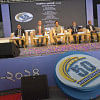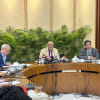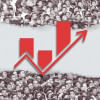Bring reforms in revenue generation, exchange rate
Reforms need to be brought about over revenue generation, currency exchange rate, banking and public expenditure, the four areas vital to the country's economic performance, through the upcoming national budget, suggested an economist yesterday.
Government expenditure stands at around 14 percent to 15 percent of the gross domestic product (GDP) in Bangladesh, said Mohammad Abdur Razzaque, chairman of the Research and Policy Integration for Development (RAPID).
However, that in other countries vary between 24 percent and 25 percent, he said.
The government needs to increase the tax to GDP ratio to raise expenditure and investment, he said, adding that if government investment rises, so would that of the private sector too.
Secondly, the economy has also been suffering from the volatile exchange rate of the local currency against the US dollar as the rate is not market oriented, for which different sectors enjoy different rates. So, reform is needed here, Razzaque said.
Third, a massive reform is needed in the banking sector to offset the presence of a huge amount of default loans and for enhanced transparency in the sector, he said.
Fourth, qualitative reforms are needed in public expenditure management to ensure justified selection of projects and accountability in the spending of public funds, the RAPID chief also said.
This is the best time for reforms in those areas, Razzaque said.
The economic success of Bangladesh is diminishing for rising income inequality and discrimination, he added.
Razzaque was addressing a discussion on "Budget for 2024-25: Key challenges and way forward" organised by the RAPID at National Press Club in Dhaka.
Bangladesh still has room for accruing external debt as international practices permit availing up to 40 percent of the GDP, said M Abu Eusuf, executive director of RAPID.
The annual development programmes (ADPs) need to be implemented year-round instead of in a hurry in April, May and June, meaning the months at the end of the fiscal year, he said.
He also suggested expediting the implementation of special economic zones so that industries could start running operations there as soon as possible.
The economist also suggested that the government reduce borrowing from commercial banks.
It was predicted at the end of last year that the economy would be able to cushion itself from blows in 2024, said Shawkat Hossain Masum, head of online of Bangla daily Prothom Alo.
Now the time has come for a soft take-off as global pressure on the economy has been easing gradually, he said, adding that everyone wants a fresh start from the next budget.
He suggested increasing the tax to GDP ratio, bringing about reforms in the banking sector and undertaking measures for reducing inflation which has been hovering at more than 9 percent since March last year.
Businesses have suffered the fallouts of the pandemic and Russia-Ukraine war and for this the tax rate should not be raised this year, said Ashraf Ahmed, president of the Dhaka Chamber of Commerce and Industry.
The corporate tax rate is 27.5 percent for non-listed companies but in practice in turns out to be much higher, he said.
The law must be enforced for increasing tax collections and the National Board of Revenue alone cannot enforce the law as a social movement is needed, said Muhammad Abdul Mazid, former chairman of the NBR.
The government is going to place a budget worth Tk 8 lakh crore this time and the prime target is on identifying how to execute the projects timely, said Md Shahiduzzaman Sarker, state minister for planning.
Lawmaker Md Nasser Shahrear Zahedee, said the government has been working to control price hikes of essential food commodities.
However, the focus needs to be given on quality education and health, he said.

 For all latest news, follow The Daily Star's Google News channel.
For all latest news, follow The Daily Star's Google News channel. 








Comments